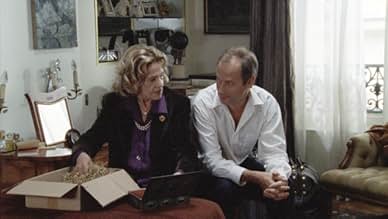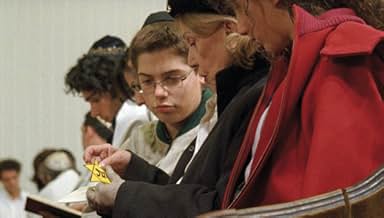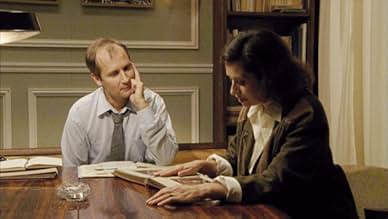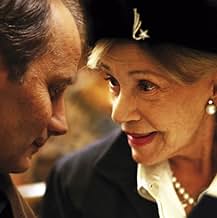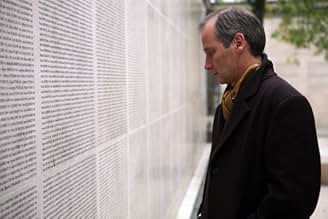Agrega una trama en tu idiomaA man endeavors to collect memories of his grandparents who died in a concentration camp during the Holocaust.A man endeavors to collect memories of his grandparents who died in a concentration camp during the Holocaust.A man endeavors to collect memories of his grandparents who died in a concentration camp during the Holocaust.
- Premios
- 2 nominaciones en total
Jan Oliver Schroeder
- L'Officier allemand
- (sin créditos)
Argumento
¿Sabías que…?
- TriviaExceptionally aired on French television the day before opening in theaters.
Opinión destacada
Based on an autobiography by Jerome Clement, One Day You'll Understand explores the painful journey a man takes in digging up the past to understand his lineage more, where it becomes an obsession to fuss over old photographs and articles in trying to shed light on events rooted in the Holocaust, and having the Nazi war criminal trial of Klaus Barbie simultaneously providing a related backdrop.
But watching this film is also painful for me, not because I don't buy into the theme or feel empathic toward the major human atrocities committed during WWII. It's painful because of the way the film was shot, that I believe perhaps only those who are faced with similar issues, would find the lengthy pauses a provision of space to breathe in. Very little is said, and there are enough long takes here for you to take a break and not miss anything much as well. Lengthy conversational pieces between Victor (Hippolyte Girardot) and his wife and mother dwell more on the mundane issues just like everyday life, and my attention started to wander and admire the household furniture instead.
It's set in Paris with the Jewish family facing a crisis of sorts when Victor disengages from his family and falls deeper into the rabbit hole, and the more interesting events start to pick up only when he successfully tracks down the humble abode his grandparents were found to be hiding in from the Nazi persecution, which begins some flashbacks and re-enactment. Of course one would wonder whether revisiting a place where events took place would result in emotion as seen here, particularly if one was not primarily involved then, but only through reports and accounts read. Which of course stretches your imagination should you feel like buying into this argument.
The story of Victor's grandparents triumphs over that of his current everyday life, which for the most parts is quite an unremarkable and unimpressive story, until a tangent develops and Jeanne Moreau's Rivka starts to assert her presence and the story shifts gears into a more compelling subplot with more emotional impact that calls for your involvement, since it had something to do with the inevitable journey of life at the end of the road, and the leaving of a legacy behind.
As one of the character advised, what's done is done and you cannot change anything, I feel that this film was an exercise in itself in wanting to translate a personal memoir into a movie, but failed to translate the emotions that came along with it in more powerful terms. Definitely not going into my list of Amos Gitai films to recommend.
But watching this film is also painful for me, not because I don't buy into the theme or feel empathic toward the major human atrocities committed during WWII. It's painful because of the way the film was shot, that I believe perhaps only those who are faced with similar issues, would find the lengthy pauses a provision of space to breathe in. Very little is said, and there are enough long takes here for you to take a break and not miss anything much as well. Lengthy conversational pieces between Victor (Hippolyte Girardot) and his wife and mother dwell more on the mundane issues just like everyday life, and my attention started to wander and admire the household furniture instead.
It's set in Paris with the Jewish family facing a crisis of sorts when Victor disengages from his family and falls deeper into the rabbit hole, and the more interesting events start to pick up only when he successfully tracks down the humble abode his grandparents were found to be hiding in from the Nazi persecution, which begins some flashbacks and re-enactment. Of course one would wonder whether revisiting a place where events took place would result in emotion as seen here, particularly if one was not primarily involved then, but only through reports and accounts read. Which of course stretches your imagination should you feel like buying into this argument.
The story of Victor's grandparents triumphs over that of his current everyday life, which for the most parts is quite an unremarkable and unimpressive story, until a tangent develops and Jeanne Moreau's Rivka starts to assert her presence and the story shifts gears into a more compelling subplot with more emotional impact that calls for your involvement, since it had something to do with the inevitable journey of life at the end of the road, and the leaving of a legacy behind.
As one of the character advised, what's done is done and you cannot change anything, I feel that this film was an exercise in itself in wanting to translate a personal memoir into a movie, but failed to translate the emotions that came along with it in more powerful terms. Definitely not going into my list of Amos Gitai films to recommend.
- DICK STEEL
- 18 abr 2009
- Enlace permanente
Selecciones populares
Inicia sesión para calificar y agrega a la lista de videos para obtener recomendaciones personalizadas
Detalles
- Fecha de lanzamiento
- Países de origen
- Sitios oficiales
- Idiomas
- También se conoce como
- One Day You'll Understand
- Productoras
- Ver más créditos de la compañía en IMDbPro
Taquilla
- Total en EE. UU. y Canadá
- USD 145,642
- Fin de semana de estreno en EE. UU. y Canadá
- USD 19,198
- 2 nov 2008
- Total a nivel mundial
- USD 195,366
Contribuir a esta página
Sugiere una edición o agrega el contenido que falta

Principales brechas de datos
By what name was Plus tard (2008) officially released in Canada in English?
Responda

